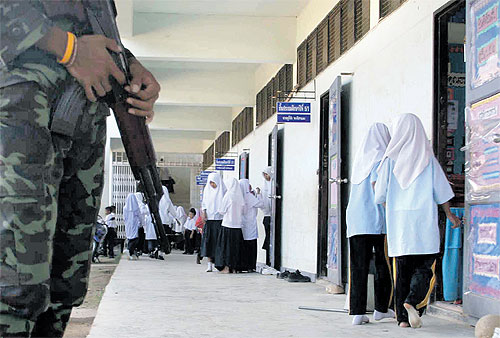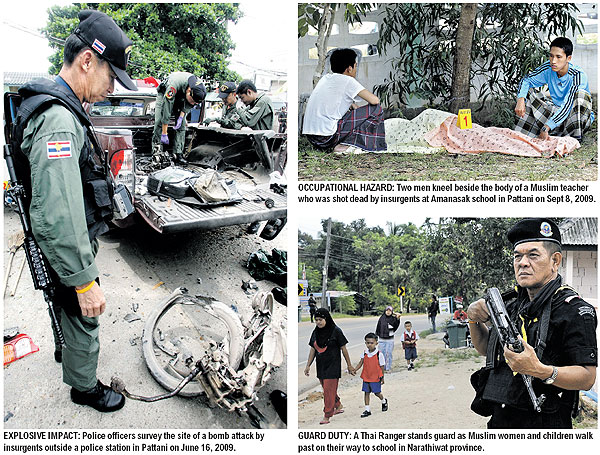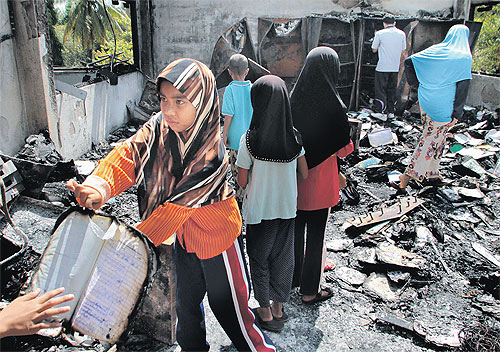
Bruger
Antal indlæg: 3600
Tilmeldt: 03.07.09
Status:
Offline
|
Teachers tell of lessons in the firing line
Armed escorts, shootings, bomb threats and hazard pay _ all just part of daily life for educators in the far South who have found themselves growing targets of a ruthless insurgency. Three shared their stories with 'Spectrum'
'There is a saying among insurgents: 'Get Buddhists, gain merit,"' says Khru Ya, a retired Muslim teacher in Pattani province. "They believe that if they kill Buddhists, they will go to heaven."

SCHOOL SECURITY: A soldier stands guard at Ban Ranor school, in Yala’s Bannang Sata district. Since violence in the South escalated in 2004, 157 teachers have been killed in the region.
Born and raised in the southern border province, Khru Ya said he has seen his home transform from a place of peace and cultural vibrancy to one where fear and sadness now dominate daily life.
From restaurant arson and roadside bombings, the violence that erupted in the deep South in 2004 has now spread to the region's schools, where teachers, considered government representatives, have increasingly become the targets of callous insurgent attacks.
Since the attacks on teachers began, 157 have been murdered. Most of the victims were Buddhist.
In the most recent attack on Tuesday, two teachers were murdered in broad daylight inside their school grounds. Security at the school was supposedly tight.
The attacks prompted the Teachers' Federation of the Three Southern Border Provinces to announce on Wednesday the two-day closure of 1,200 classes in the deep South.
Spectrum spoke to Khru Ya and two other teachers working in the area about lives spent facing the spectre of violence on a daily basis. They did not use their real names for security reasons.
Khru Ya lives and worked in Pattani's Muang district, where security is tight. "Luckily, not many attacks happen here, unlike many other areas in Pattani. We only have bombings here about once a month," he said.
"Even though the violence does not affect me much where I live, I have many friends who have been injured or killed."
Under security measures devised by the Internal Security Operations Command Region 4, armed soldiers now accompany teachers whenever they venture outdoors.
Just like any other job, the working week for teachers in the South starts on Monday morning. But there is one slight difference _ their week is heralded by the arrival of heavily armed security officers at their doorstep, ready to take them to work.
"Every morning all the teachers here have to wait for a military truck to pick them up," Khru Ya said. "Those who prefer to commute to school in their own vehicles have to travel with the military convoy. We all get escorted to school every morning.
"After we arrive at school, the soldiers stick around for a while until the morning flag-raising ceremony is over and the students are in their classrooms.
"At lunch time, the soldiers return to protect us inside the school grounds. Then the same thing happens in the afternoon when class is over; the soldiers escort us back home.
"I felt a bit uncomfortable at first, but I understand this is all for the sake of safety and I feel thankful for it."
Many of the casualties of violence in the deep South have been teachers, and among educators who have been killed, Buddhists make up the vast majority.
The attackers are known locally as jone (unaffiliated bandits) and jone gra jork (cowardly bandits).
"Instead of soldiers, these [insurgents] seem to target only teachers because they are unarmed and easy to kill. That is why we call them jone gra jork, because they choose to attack people who have no way to fight back," Khru Ya said.
"I know what they really want is to drive the military out of the area, so that they can trade and traffic drugs more easily. Pattani is located in a very advantageous area for drug trafficking since it is connected to Malaysia.
"They are trying to create a religious war in the area, but Buddhists and Muslims are peaceful people. We have lived happily together before in the past, and we intend to remain that way."
Khru Ya says people in the area are afraid to go to the police with information or even to talk to security officers. If the jone gra jork learn that someone in the village went to see police, he said, they will shoot them.
"So now we are living in fear," he said.
"I want to see my hometown go back to the peaceful city it used to be; the town many tourists came to visit and used as a gateway to go to Malaysia.
"We used to have many foreigners visiting, but ever since these people started attacking innocents, no one wants to come.
"I think one of the easiest solutions is to have the government come up with a policy to take away guns and weapons from everyone in the area. Right now, each household has at least one gun. If there are no guns, there will be no shooting."
Mr Pol, a 31-year-old Buddhist teacher from Yala, took a risk when he took on a more lucrative job at a government school in the province.
"I keep reading news stories [about teachers being killed] and I hope I don't end up that way," he said.
Mr Pol used to work for a private school in Yala town, but recently achieved his goal of being designated as a government official. Teachers at government schools fall into two groups _ government employees and officials.
Government officials must go through more arduous testing to become accredited and receive better benefits than employees.
Knowing the lifelong benefits the new position would bring for himself and his family, Mr Pol says he was willing to take the risk by going to teach in a more dangerous area away from the city.
The new school is about 30km from where his family lives in Betong.
"For the first few months, I commuted back and forth every day from home to school. Then I realised it was too dangerous since I had to go through deep jungle and hill areas, so I decided to stay at the teachers' accommodation that they provide for us," he said.
Mr Pol's daily routine is a familiar one for teachers in the area. "On Monday morning, all the teachers who went back home over the weekend will meet together at a spot where soldiers pick us up in a big truck. Teachers who drive their own car will also join the convoy and be escorted to school," he said.
"Our life starts every day with soldiers waiting outside the house. We get ready and go to school. Then on Friday I go back home to Betong. Soldiers always escort me wherever I need to go.
"I used to feel safe having soldiers guarding us around the clock like that. But when I saw the news [on Tuesday] that there were teachers killed in their own school by someone dressed as soldiers, I felt like I couldn't trust anyone any more.
"Where I am now is very dangerous. Just like everyone here, I am scared and I don't want to die. I have been doing this for one year. Once I have worked two years here, I will ask to be transferred back to Betong, where it is safer.
"I want to be transferred to a safer place just like every teacher here, but the schools in this area are in need of teachers. If the government can do something to improve the security situation, I believe more teachers would want to come to work in this area, and then the kids would be given more opportunities to learn."
But the security measures afforded to Khru Ya and Mr Pol are not enjoyed by all teachers in the South. Some, like 50-year-old Mr Doh, are effectively left to fend for themselves.
While many are drawn to teaching in government schools by the generous welfare benefits, Mr Doh, a Buddhist from Narathiwat province, says he only dreams of children in the far South one day having access to a proper education.
Mr Doh is a government employee, rather than a government official, and as such he receives limited benefits despite doing the same job.
Government employees would normally work in schools in roles such as teachers' aides, however due to a shortage of teachers in the deep South they often assume full teaching responsibilities in trouble spots. ''I work for a government school in Pattani province, in the middle of deep jungle in an area designated as a 'red zone','' he said. ''People are shot dead along the road to the school almost every day.
Mr Doh lives 30 minutes from school and commutes to work each day by motorcycle. Because he is not a government official, he is not entitled to a personal military escort.
''I can choose to arrive at the same time as the teachers and get escorted to school as part of a group with them, but I choose not to,'' he said. ''I am trying to avoid the peak hour when teachers commute to school. Even with military protection, there are still bomb attacks from time to time.
''Knowing the nature of the attacks, I choose to go to work either earlier or a little later than the appointed time, and do the same when coming home.
''Since I have no housing allowance, I have no choice but to travel back and forth everyday.''
Mr Doh receives a 2,500 baht monthly hazard pay bonus for working in the deep South. But despite that being the extent of his benefits package, he said he is still compelled to go to work every day in the interests of providing education to as many children as possible.
Mr Doh cried as he explained his struggle to Spectrum.
''The teachers can ask to be transferred after they serve two years in their post. But for us [government employees], the same rule does not apply. We can't ask to be transferred and the government has no policy to support us,'' he said. ''I earn less money, I teach more classes, and I am entitled to nothing. I can't even get a government loan since I am not a government official.
''I have worked in the same position until the age of 50 and I still am not eligible to be a government official. I took the test in order to become an official, but they said there were no positions available.
''It would be nice if the government recognised our work and offered us the same benefits as the officials.
''Do I get scared? Very much. I have family to take care of, and I can't end up this way.
''The reason I keep doing it is only because I want the children to be able to study.
''With all the recent violence [this week], all of the schools in the far South are closed again. I am afraid there will not be enough time for students to learn. It is almost the end of the semester.
''I think the only way to solve all this violence is to change the attitude of the younger generation. That is why I am happy to take a risk if I know that what I am doing can contribute to solving the problem.
''If children are well educated, they can turn the situation upside down and help make our home a safe place to live in again.''
'No one is forced to go': govt measures for teachers
The Education Ministry provides a range of welfare benefits and security measures to help attract and protect teachers in high-risk areas of the far South, an education officer says.
The officer, from the Bureau of Educational Development for the Special Administration Zone in the South of Thailand, which is a part of the ministry's Office of the Basic Education Commission, said teachers were not forced to take up posts in the troubled region.
''There is nothing different from how we normally recruit teachers,'' the officer said.
The ministry announces vacant positions, inviting applicants to take an examination, the officer said. If they pass, they are offered the choice of where they want to work.
''We divide the area up into different districts within the same province. Teachers who pass the test then have the right to choose which district is convenient for them, but we have the final say on which school they will be assigned to.
''Before teachers accept the position, we inform them of the school they have been assigned to. Then it is up to them to decide whether to accept it or not.
''Applicants are free to reapply for the next round of offers if they decide to reject the position.
''Once they complete two years in the appointed school, they can ask to be transferred to another school where there is a vacant position. We will review their performance and proceed accordingly,'' the officer said.
Teachers who are hired to work in government schools and given the status of government officials are entitled to full civil servant benefits.
But those who are assigned to high-risk areas, such as Yala, Pattani, and Narathiwat provinces, are also given an extra ''danger allowance''.
''The teachers who are government officials receive 3,500 baht on top of their monthly salary. Teachers who are government employees receive an extra 2,500 baht,'' the officer said.
''We take good care of all the teachers who decide to work in such dangerous areas by providing them with good life insurance policies, housing allowance, and medical insurance.
''Since there are safety and security issues in those areas, we ensure that all teachers can work worry-free by providing them with armed security escorts.
''On top of the standard benefits that teachers get, we also offer some extra benefits in case of death.
''The family of any teacher who is killed will get 500,000 baht from the Bureau of Educational Development for Special Administration Zone in the South of Thailand, plus another 500,000 baht from the Office of the Welfare Promotion for Teachers and Education Personnel.
''I understand that money can't replace the loss of a person, but we are trying our best we can to ensure everyone's safety and security.''


FUTURE IN FLAMES: Thai-Muslim girls help remove burnt books after their school was ravaged by a fire in Pattani province earlier this month.
http://www.bangko...iring-line |
